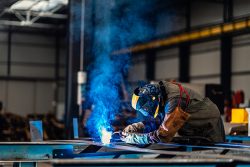How Metal Fabrication Helps Drive Industrial Sustainability
May 26, 2023 5:59 pm Leave your thoughts How Metal Fabrication Helps Drive Industrial Sustainability
How Metal Fabrication Helps Drive Industrial Sustainability
Metal fabrication is a critical manufacturing process that involves cutting, bending, and assembling metals to create a final product. It is an essential part of the industrial sector and plays a crucial role in many businesses, from small shops to large manufacturing plants. With sustainability being a driving force in modern industries, metal fabrication can also contribute to the achievement of environmentally responsible and socially equitable operations. In this blog post, we will explore how metal fabrication helps drive industrial sustainability.
Recycling and Reusability
One of the most significant aspects of industrial sustainability is recycling and reusability. In metal fabrication, many metals, such as steel, aluminum, and copper, can be recycled and used again, reducing the need for new metal production. Most metals today are made from recycled materials, and the metal fabrication process can be used to create new products from old materials, often with minimal waste. This process not only conserves natural resources but also reduces energy consumption and greenhouse gas emissions.
Energy Efficiency
Metal fabrication machines and processes have come a long way in terms of energy efficiency. Modern metal fabrication machinery often uses sophisticated computer systems to operate, leading to higher precision and speed. These machines often include features, such as automatic shut-off and sleep modes, reducing energy consumption and reducing the overall environmental impact of manufacturing.
Renewable Energy Sources
Sustainable manufacturing often relies on using renewable energy sources, such as solar, wind, and hydropower. Metal fabrication manufacturers can use these renewable sources to power their operations, reducing reliance on fossil fuels and helping reduce greenhouse gas emissions. Additionally, the use of renewable energy sources can lead to significant cost savings over time, making it an attractive option for many businesses.
Lean Manufacturing
Lean manufacturing is a method of industrial production that focuses on maximizing efficiency and minimizing waste. It is a critical component of manufacturing sustainability in the industry. Metal fabrication lends itself well to lean manufacturing principles, as precision and efficiency are essential in the process. By reducing waste and maximizing manufacturing efficiency, the amount of raw materials used is minimized, and production costs are reduced.
Reduced Carbon Footprint
Reducing carbon emissions is a crucial goal for many industries to reduce their environmental impact. Metal fabrication can help drive sustainability by reducing the carbon footprint of many products. For example, light weighting products, such as cars and planes, reduce the amount of fuel required for transportation, resulting in lower greenhouse gas emissions. Additionally, metal fabrication can be used to create energy-efficient products, such as solar panels, wind turbines, and other renewable energy products, helping to reduce reliance on fossil fuels.
Water Management
Water is a critical resource in many industries, but can also be a significant source of pollution. Metal fabrication processes can use considerable amounts of water for cooling and lubrication. Sustainable manufacturing practices can minimize water usage and wastewater generated, leading to higher efficiency and reduced environmental impact. By using recycling systems that capture and reuse wastewater, metal fabrication manufacturers can conserve water and reduce the amount of pollutants released into the environment.
Social Responsibility
Sustainability in manufacturing goes beyond environmental considerations. Social responsibility, such as worker safety, fair labor practices, and community well-being, is also essential. Metal fabrication companies can provide jobs and invest in local communities, contributing to their social and economic sustainability. Additionally, metal fabrication manufacturers can focus on worker safety and provide a safe and comfortable working environment, promoting employee well-being.
Final Thoughts
In conclusion, metal fabrication plays a critical role in driving industrial sustainability. The metal fabrication manufacturing process lends itself well to sustainable practices, such as recycling and reusability, energy efficiency, renewable energy sources, lean manufacturing, reduced carbon footprint, water management, and social responsibility. Embracing sustainable metal fabrication practices can help manufacturers conserve natural resources, reduce energy consumption, and minimize environmental impact. As companies continue to work towards a sustainable future, metal fabrication will undoubtedly play an integral role in achieving broader sustainability objectives.
Categorised in: Metal Fabrication
This post was written by admin
